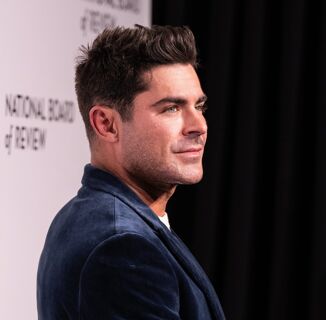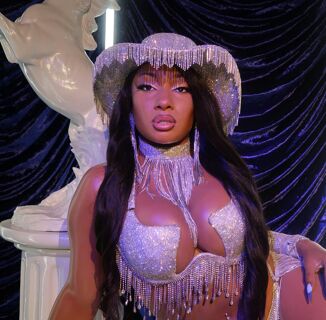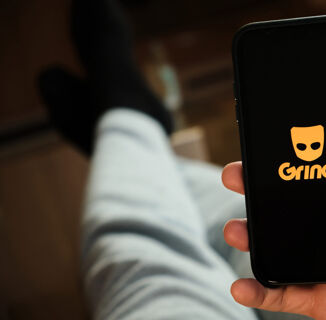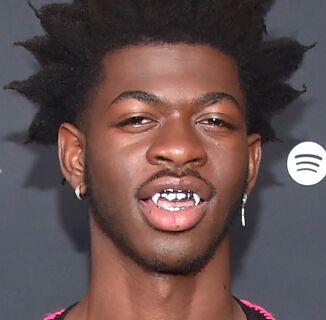The public discussion about transgender representation on television has largely been a conversation about Transparent.
In 2014, when the show first debuted on Amazon, creator Jill Soloway (then a cisgender heterosexual-identified woman) came out about their own parent’s transition (exclusive to the New York Times), which was said to have inspired the show. The casting of Jeffrey Tambor in the lead role of Maura was controversial for those both inside and supportive of the trans community, who have been protesting the casting of cis men in the roles of trans women for as long as cis men have been playing them. Soloway’s hiring and mentoring of trans actors cast and crew satisfied some, but not all. The same 2014 Times profile mentioned a heated exchange where Soloway was first publicly taken to task by a trans person unhappy about Tambor’s casting. Despite the contention, Soloway, Tambor, and Transparent won awards and critical accolades over the first four seasons and helped to foster more cultural conversations around trans identity and people.
Four years later, a lot has changed.
Soloway now identifies as non-binary, preferring they/them pronouns, and has been dating women after divorcing their husband. These changes were followed by Tambor’s termination for the alleged sexual harassment of two trans women on set (Tambor’s former assistant Van Barnes and Transparent co-star Trace Lysette) and gave way to harsher criticisms of the person behind the show, especially after early statements and reports purported Soloway’s support not of Barnes and Lysette, but of Tambor. Amazon eventually fired Tambor from the show, leaving Soloway to work around Maura’s exit for the fifth and final season.
Their latest work, She Wants It, is a memoir — their second. The first one, from 2005, seems like it was from an entirely different person, and not the same individual who was then a parent to two young sons and a television writer looking to Make It in Hollywood. Musings in that memoir, Tiny Ladies in Shiny Pants: Based on a True Story, were less evolved.
“Much like transgender people who felt their whole lives like something was just off, my soul had actually slipped into the wrong body,” Soloway wrote 10 years before Transparent. “Here it was, finally, the truth: I was a gay man trapped in a woman’s body.” In another section, they write: “How was I supposed to know lesbians had feelings, too?” believing their lesbian professor wouldn’t “take me seriously until the hair on my head was shorter than the hair under my arms.”
She Wants It is Soloway’s update on their own personal evolution, peppered with tidbits of interest to the Hollywood set, LGBTQs paying attention to pop culture’s sudden interest in trans people, and feminists — but mostly to those who are an intersection of the three. The publicity tour included morning talk shows and typical mainstream press, as well as highly-publicized events in major cities boasting guests like Lindy West, Roxane Gay, and Morgan Parker. In a handful of events, Soloway’s sister, Faith, performed songs from the Transparent musical she’s been readying, and in others, feminist debates were staged between the likes of Eileen Myles and Masha Gessen.

“You know, it was a slow process,” Soloway told INTO. “It wasn’t like a big day of like ‘Hey, I’m queer and non-binary.’ It’s over the course of many years in the book where it’s like I think I might be gay. I think I might be, and then moving to the space that was non-binary identity.”
It’s not difficult to see why some still find Soloway’s whole thing to be a circus act borrowing from marginalized people whose identities have long been co-opted for capital gain. The book is the first account of their parent’s coming out as trans, Soloway’s initial reaction, and the speed at which they spun it into fodder for a TV series. The book is not entirely navel-gazing — there are some thought-provoking ideas regarding the somewhat homoerotic way powerful men regard one another and their use and disposal of women in the process, as well as regarding gendered parenting — but there is certainly a huge focus on Soloway’s late-in-life sex and gender awakening, as well as some details on Tambor’s exit from Transparent.
“Well, I’m attempting to take some sort of radical liberation, radical feminist, radical trans liberation and hide them in a kind of more popular culture voice,” Soloway said of the book. “I like to simplify certain aspects of politics, and I also like to do my best to remain vulnerable and likable.”
Perhaps what people want most from Soloway is, well, transparency — to feel like they aren’t being duped into falling for a show, a series, a thought-process that will inevitably disappoint them by being something else entirely. Soloway’s defense of Tambor from when he was first cast up until he was let go from the show had some seeing Soloway as a co-conspirator of sorts; an apologist on the side of the cis straight man accused of harassing members of the community he is not a part of but is honored by Hollywood for portraying.
Still, as conversations about Woody Allen move toward the culpability of the women who have worked and continue to work with him, so do those about holding women and marginalized people accountable for the actions of the offending men.
“I think that anybody who’s not a white male of a certain class is going to be [wrestling with this] because the moment you open your mouth and you put yourself out there and say ‘This is me,’ you’re vulnerable,” Soloway said.
“We have so much to do and sometimes I feel way too powerful and way too loud,” they continued. “And then, a few days ago I was in New York and I was doing an interview from the floor of the stock exchange for a website called Cheddar. I looked around at the stock exchange and went: ‘Nothing that’s going on here, even for an instant, takes into account the power of queerness or feminism.'”
Soloway straddles two worlds — one in which queerness and feminism reign, and the other is dominated by big business and binaries. Transparent, She Wants It, and subsequent queer, trans, feminist-themed projects (including their book imprint with Amazon) are attempts at marrying the two — which is a difficult task and not one that either side is much interested in. This is especially true when considering that many trans people aren’t thrilled with Soloway — despite now identifying on the trans spectrum — being the mouthpiece for the community.
“I think it’s kind of scary to interact with people who are more educated than I am in the trans community who are calling me out for speaking from a place of privilege without having experienced certain kinds of oppression,” Soloway said. “I think my privilege around accessing audience and my voice is always going to get in my way. I’m always going to be offending people because I’m always going to be speaking from a place of…I’m always going to be fighting PC around my privilege. That’s, I think, a hard thing to do, to say I don’t know everything yet. I’m going to come out and speak for this movement because I’ve found myself in this place from having made Transparent and that’s scary.”
Soloway is well aware of their critics, specifically from within their own LGBTQ community.
“People have learned to bully and humiliate others as a way to feel powerful, and so when I see people doing it to me from inside the movement, I just look at them and I think they feel powerless in the exact same way,” Soloway said. “I ask myself if there was somebody I didn’t agree with, how loudly and how angrily would I attack them if they were from my community. Would I want to hang somebody out to dry publicly if they were from within my community? And I don’t do that, you know. I email somebody privately. I have a private conversation with them.”
In She Wants It, Soloway writes about having one of those conversations with Lysette after finding out Lysette went to the press with her allegations against Tambor.
“We could handle this, I wanted to tell her, but let us do it internally, inside the family,” Soloway writes. “If Trace released a statement, it would be over for Jeffrey. And that meant Maura. The show. Our TV family. Everything.” The emotional conversation, as recalled by Soloway, supports the idea that Soloway would prefer to have some conversations in private — though others, it appears, are totally fine to have in public, or fictionalized on a television show. The week of this conversation, it first became public that Soloway was dating Hannah Gadsby, something else Soloway declines to comment on for now, despite having a very public relationship (and breakup) with poet Eileen Myles (also detailed in the book).
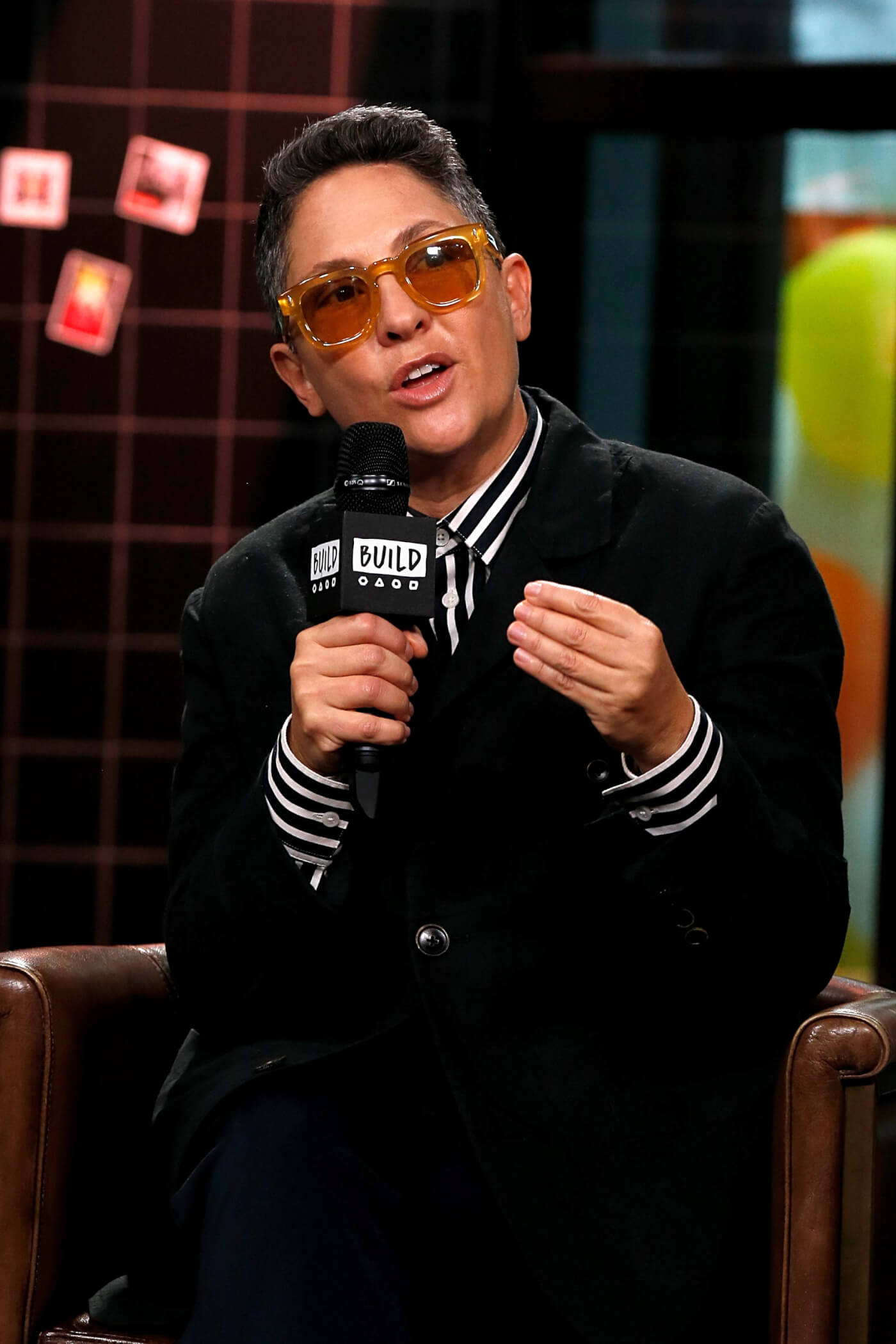
“You know, nobody out here really likes the question: ‘What do your kids think?'” Soloway said. “I don’t really like that question. I get asked that. It has absolutely nothing to do with my work. Nobody is asking politicians ‘What your kids think of your work?’ and I’m doing political work. I’m attempting to use the power of story and narrative to create motions of centering. How to center, how to move yourself from the feeling of being other to the feeling of being centered. And so it seems like I’m kind of the creative confessional housewife who’s telling her story because it’s juicy and it’s not that, you know?”
During their first Los Angeles appearance for She Wants It, Soloway took the stage to talk hot topics with Roxane Gay. Gay, a prolific and highly lauded writer and academic, shared that she has recently been trying to be less harsh on people who she finds things in common with, but has fundamental disagreements with — “Like Bernie supporters,” she suggested. Soloway seems to agree with this approach, or at least, finds the position to be more appealing than wasting time listening to detractors and self-doubt.
“Sometimes I go ‘Jill, you’re too loud — shut up. Don’t publish the book, don’t speak, people are going to come after you, don’t, don’t,'” Soloway said. “And sometimes I go, ‘Actually, you haven’t even begun to have a real dent.’ I mean, women and queer people haven’t even begun to have a real dent in this political world. So you know, sacrifice the discomfort, sacrifice the potential arrows and just go for it.”
Despite winning highly-coveted awards and million dollar budgets, Soloway believes that the privilege and power they have are still so small compared to the larger, cisgender, male-driven heterosexual world that LGBTQs, women, and minorities exist in. She Wants It deploys some sports metaphors in order to help illustrate some points, and the same is true in conversation.
“We simply aren’t even really beginning to affect the world in any real way,” Soloway said. “When I think about this budget of Transparent for four years, we’re still not even adding up to a small part of one baseball player’s salary. Four years of production, everybody’s job would be the leg of Giancarlo Stanton. One person — one baseball player and not even his whole body would be all of our capacity at Transparent.“
What Soloway wants is for men to read She Wants It. Specifically, they want “cis men to engage in some of the concepts” in the book — like that their toxic homosociality and shame keep them from being able to see women as anything but objects or pawns.
“They have been asked by alpha men, ‘Hey, let’s humiliate this woman together just by talking about her, by calling her a slut, by calling her a whore behind her back.’ Straight men need to say ‘I hate that when it happens to me,'” Soloway suggested. “They have been the object of this kind of bullying by being told they’re a pussy or they’re a sissy by men just like this. So I really hope that’s the one thing that would be really cool is if this book was able to move out of LGBTQ biographies, feminist rabble-rousing, and move into — I’m interested in the kind of thought leadership that people like Malcolm Gladwell get to do, and they bring ideas into the culture and the culture discusses them.”
Soloway is looking for more feminist intellectuals — they offer Gay and Jessica Valenti — and their work to break into the cis male mainstream.
“I’m reading some of the most amazing scholarship about consent and desire and you never see men talking about it, tweeting it, promoting it,” Soloway said. “For years all of us have been — I have been promoting and forwarding and admiring the works of men, whether it’s David Sedaris or Augusten Burroughs or Jon Stewart or David Letterman. Every single man who has defined my culture since the age of 21. So women, queer women, we’ve all been promoting the works of men. Why aren’t men promoting our work? Why aren’t men talking about and promoting and engaging with our ideas and work?”
A valid question, to be sure, but it makes one wonder if Soloway’s latest identity is a manifestation of needing to look more butch in order to feel deserving of that kind of seriousness. In several instances — both pre-She Wants It, in She Wants It, and on the book tour — Soloway insists that part of their new more masculine-of-center appearance is one in which they felt more powerful, “free to be a thinker.” There is a distinct difference between eschewing femininity for its personal aesthetic vs. its public appeal, and at times, it can feel like Soloway’s butchness is an orchestrated look — nonbinary, but make it fashion. Perhaps that’s because the dramatics of the “before” and “after” accompanied by commentary on the change are sometimes off-putting, which is why commentary from some Transparent fans who went to see Soloway’s book tour share a tortured, not-quite-sure sentiment.
“Sometimes I’m just inspired by the way somebody like Trump thought he could be president,” Soloway said, “and the way that white men of a certain class believe they have the right to power. And the dream is — you know, for a queer trans person in my lifetime –the dream is for nonbinary vision of God.”
The struggle for Soloway, and other public figures who identify as and ultimately represent marginalized communities such as trans and queer folk, is that their public platform affords them a voice and visibility that has long been denied. Soloway understands that, but doesn’t see it as a reason to ignore the soapbox built for them to step upon, even if others would prefer they give the mic to someone else they deem more qualified.
“The book feels like it’s really the right thing at the right time for me right now,” they said. “It couldn’t actually be more newsworthy to last week, to be in public — last month in a public, political conversation around confronting Kavanaugh, and this week being in a public political conversation around trans bodies. It actually feels very much the right time and the right book and the right conversation.”
Images via Getty
Help make sure LGBTQ+ stories are being told...
We can't rely on mainstream media to tell our stories. That's why we don't lock our articles behind a paywall. Will you support our mission with a contribution today?
Cancel anytime · Proudly LGBTQ+ owned and operated
Read More in Culture
The Latest on INTO
Subscribe to get a twice-weekly dose of queer news, updates, and insights from the INTO team.
in Your Inbox






